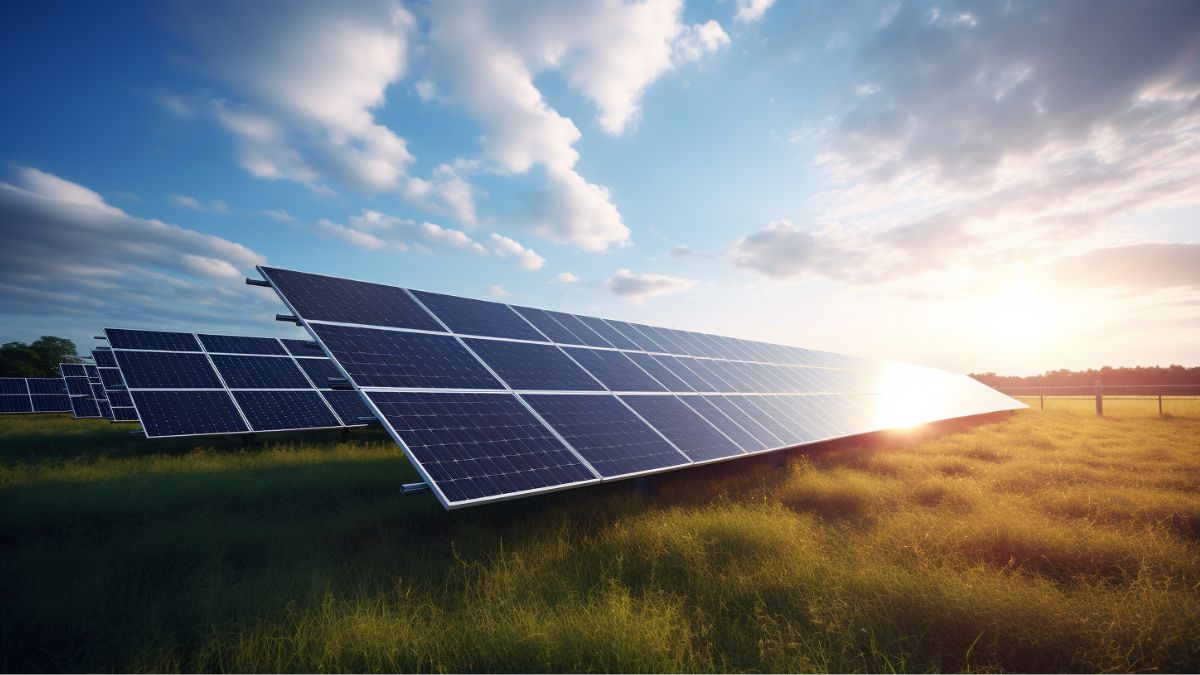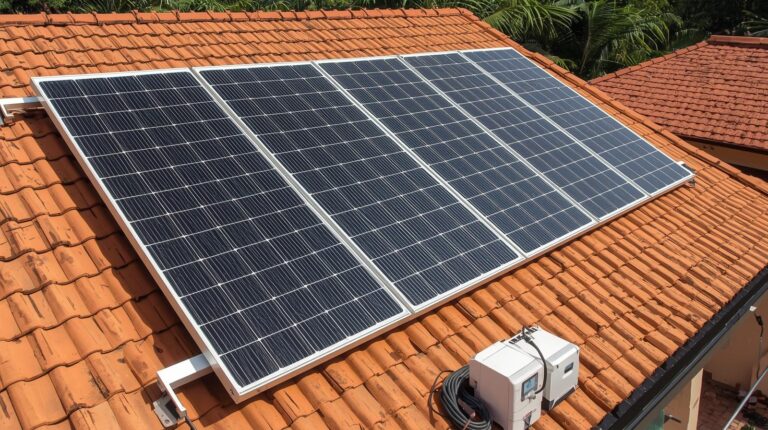Looking to maximize your solar energy production? Consider a ground-mounted solar panels system!
If your roof isn’t the best option for solar, ground-mounted systems provide a flexible alternative. They can accommodate larger electricity needs and offer easier access for cleaning and maintenance.
While they may be more expensive upfront, ground-mounted systems can maximize energy production depending on your roof’s orientation and shading. Compare quotes and consider factors like efficiency, price, and warranty to choose the best panels for your ground-mounted system.
Supercharge your energy with ground-mounted solar today!
Key Takeaways
- Ground-mounted solar panels are a suitable option when the roof is not ideal for solar or when there is a need for higher electricity consumption.
- Ground-mounted systems offer flexibility in installation location and can accommodate larger electricity needs.
- Standard ground-mounts and pole-mounts are two common types of ground-mounted solar system installations.
- Ground-mounted systems have advantages such as maximizing sunlight exposure, better air circulation, and easier access for maintenance, but they also require valuable land and may interfere with other land uses.
Space and Location Considerations
If you’re considering ground-mounted solar panels, there are several important factors to keep in mind. First, make sure you have sufficient sunlight and space for trenching and running wires. Trenching requirements are crucial as you will need to dig trenches to lay the necessary wires for your solar panels.
In addition, it is important to consider property line considerations to avoid encroaching on your neighbors’ property. Setback regulations dictate how close the panels can be to property borders or roads, so be sure to adhere to these guidelines.
Access point planning is another aspect to keep in mind. Contractors and heavy equipment will need proper access to install the panels, so plan accordingly.
Lastly, consider the seismic zone suitability of your property. Areas near active seismic zones may not be suitable for ground-mounted solar panels.
Overall, taking these factors into account will help ensure a successful installation of your ground-mounted solar panels.
Related Post: Best Solar Panels for Limited Space, Warm Climates, and Warranty.
Financing and Incentives
Financing options and incentives may not cover certain aspects of installing ground-mounted panels. When considering the cost of a ground-mounted solar system, it’s important to research local incentives and rebates that may be available to you.
Some financing options may apply specifically to ground-mounted systems, while others may not. It’s crucial to discuss this with installers and thoroughly research the incentives offered in your area.
Cost considerations are also important, as ground-mounted systems typically have a higher upfront cost compared to rooftop installations. However, these systems can accommodate larger electricity consumption needs and may maximize energy production based on your specific requirements.
Related Article: Smart Solar Savings: Unlock The No Money Down Financing.
Suitability and Benefits of Ground-Mounted Panels
When considering your options for solar panels, it’s important to evaluate the suitability and benefits of ground-mounted installations. Ground-mounted solar panels offer several advantages that make them a viable choice for homeowners.
- Efficiency Comparison: Ground-mounted systems are typically more efficient than rooftop systems because they can be optimized for maximum sunlight exposure.
- Cost Analysis: Although ground-mounted installations may have a higher upfront cost, they can maximize energy production and potentially provide a higher return on investment.
- Installation Process: The installation of ground-mounted solar panels involves securing them to the ground and connecting them to the electrical system of your home.
- Maintenance Requirements: Ground-mounted systems are easier to access for cleaning and maintenance compared to rooftop systems.
Comparing Quotes and Options
To compare quotes and options for your solar panel installation, register on the EnergySage Solar Marketplace and mention your interest in ground-mounted options. This will allow you to explore the benefits and costs associated with both rooftop and ground-mounted systems. Below is a comparison table to help you understand the differences:
| Ground-Mounted Systems | Rooftop Systems |
|---|---|
| Higher upfront cost | Lower upfront cost |
| Maximizes energy production | May be limited by roof orientation and shading |
| Requires new square footage on your property | Utilizes existing roof space |
| Financing options available | Financing options available |
| Offers flexibility in installation location | Limited by available roof space |
When choosing ground-mounted panels, consider factors such as efficiency, cost, and warranty. Ground-mounted systems are suitable if your roof is not ideal for solar or if you have high electricity needs. By comparing quotes and options, you can make an informed decision that aligns with your budget and maximizes the energy production of your solar panel installation.
Key Takeaways and Introduction to Ground-Mounted Solar Panels
Ground-mounted solar panels operate similarly to rooftop systems but are typically more efficient. They offer several benefits and considerations that you should keep in mind when considering this option:
- Maximizing energy production: Ground-mounted systems can maximize sunlight exposure and operate more efficiently with better air circulation, resulting in increased energy production.
- Cost comparison: While ground-mounted systems can be more expensive to install compared to rooftop installations, the cost of standard ground-mounted solar is comparable to rooftop installations, and tracking systems can be cost-effective for many homeowners.
- Flexibility in installation: Ground-mounted systems offer flexibility in installation location compared to rooftop systems, making them a better option if rooftop solar is not ideal due to roof angle, orientation, or obstructions.
- Maintenance and cleaning: Ground-mounted systems are easier to access for cleaning and maintenance, allowing for efficient upkeep.
Considering these factors, ground-mounted solar panels can be a great choice for maximizing energy production and providing flexibility in installation, while also being relatively easy to maintain and clean.
Benefits and Considerations of Ground-Mounted Solar Panel Systems
One of the benefits of choosing ground-mounted solar panel systems is their ability to maximize sunlight exposure and operate more efficiently.
When comparing ground-mounted systems to rooftop installations, ground-mounted panels have the advantage of being able to be positioned in an optimal location for maximum sunlight exposure, without any obstructions from nearby buildings or trees. This maximization of sunlight exposure allows ground-mounted systems to generate more electricity, resulting in higher energy production.
Additionally, ground-mounted systems offer more installation flexibility compared to rooftop systems, as they can be placed in various locations on your property. This flexibility allows homeowners to find the best spot for their panels, ensuring optimal energy production.
In terms of maintenance accessibility, ground-mounted systems are easier to access for cleaning and maintenance, reducing the hassle and cost associated with upkeep.
While ground-mounted solar panels require valuable land for installation, the benefits of maximizing energy production and easier maintenance make them a compelling option to consider.
Factors to Consider in Choosing the Right Panels
Now that you have learned about the benefits and considerations of ground-mounted solar panel systems, let’s delve into choosing the right panels for your installation.
There are several factors to consider when making this decision:
- Panel Efficiency: Look for panels with high efficiency ratings to maximize energy production and optimize your system’s performance.
- Warranty Options: Consider the warranty offered by the manufacturer, as this will provide peace of mind and protection for your investment.
- Pricing Comparison: Compare the prices of different panel options to ensure you are getting the best value for your money.
- Installation Process: Familiarize yourself with the installation process to understand the requirements and ensure a smooth and efficient installation.
By considering these factors, you can make an informed decision and select the panels that best suit your needs.
Related Post: 7 Crucial Steps on Planning a Solar Electricity System for Your Home.
Advantages of Ground-Mounted Solar
Installing solar panels at ground level offers greater flexibility in terms of location and can accommodate larger electricity consumption needs. Ground-mounted solar panels have several advantages that make them a popular choice for homeowners.
One advantage is the ability to maximize energy production by positioning the panels for optimal sunlight exposure. Ground-mounted systems also offer cost effectiveness, as they can be sized to match electricity consumption without space restrictions.
In terms of installation considerations, it is important to check property lines and setback requirements to avoid encroaching on neighbors’ property. Wet and unstable ground in coastal areas or large rocks in the soil can also impact the installation process.
However, once installed, ground-mounted systems are easier to access for long-term maintenance, making them a practical and efficient choice for homeowners seeking to harness solar energy.
Disadvantages of Ground-Mounted Solar
While ground-mounted panels offer advantages such as optimal sunlight exposure and cost effectiveness, there are also some disadvantages to consider.
- Land Usage: Ground-mounted solar panels require new square footage on your property, which may limit the available space for other purposes.
- Installation Process: Installing ground-mounted systems involves trenching, running wires, and ensuring access points for contractors and heavy equipment, which can be disruptive and time-consuming.
- Maintenance Requirements: Although ground-mounted panels are easier to access for cleaning and maintenance, they still require regular upkeep to ensure optimal performance.
- Environmental Impact: The installation of ground-mounted solar panels may have some environmental impact, such as land disturbance and potential interference with the natural habitat.
Considering these factors will help you make an informed decision about whether ground-mounted solar panels are the right choice for your energy needs.
Installing and Maintaining Ground-Mounted Solar Panels
To ensure optimal performance and longevity of your ground-mounted solar panel system, regular maintenance and upkeep are essential.
The installation process for a ground-mounted system involves several key steps. First, proper ground preparation is necessary to ensure stability and durability. This may involve clearing the area of any debris or vegetation and leveling the ground.
Next, the wiring and electrical connections must be carefully installed to ensure safe and efficient operation. It’s important to regularly inspect and maintain these connections to prevent any potential issues.
Additionally, regular cleaning and inspection of the panels themselves is crucial to maximize energy production.
With proper maintenance, a ground-mounted system can have a lifespan of 25 years or more, providing you with clean and renewable energy for decades to come.
Related Post: Cleaning Solar Panel for Its Maximum Efficiency and Sustainability.
Frequently Asked Questions
Are Ground-Mounted Solar Panels More Efficient Than Rooftop Panels?
Ground-mounted solar panels are typically more efficient than rooftop panels due to better air circulation. They have a lower environmental impact, require easier maintenance, and offer more flexibility in installation location. However, aesthetics and long-term durability may vary.
How Much Space Is Required for Installing Ground-Mounted Solar Panels?
To install ground-mounted solar panels, you’ll need enough space for optimal orientation, consider maintenance requirements, and ensure sufficient land availability. Additionally, you should consider the environmental impact and aesthetics of the installation.
Can Ground-Mounted Panels Be Installed in Areas With Unstable Ground or Rock Formations?
Yes, ground-mounted panels can be installed in areas with unstable ground or rock formations. Mitigation strategies include soil stabilization techniques and utilizing specialized installation methods. Regular maintenance is crucial to ensure optimal performance in unstable areas.
What Are the Financing Options Available for Ground-Mounted Solar Systems?
There are various financing options available for ground-mounted solar systems, including tax incentives, leasing programs, power purchase agreements, and loans. These options can help make the upfront cost more manageable and affordable for you.
How Does the Cost of Ground-Mounted Solar Panels Compare to Rooftop Installations?
The cost of ground-mounted solar panels can vary, but they are typically more expensive upfront compared to rooftop installations. However, they offer more installation space, stable ground, and financing options. Additionally, they can maximize energy efficiency.
Conclusion
Ground-mounted solar panel systems offer numerous benefits that make them a compelling alternative to rooftop installations. While the upfront cost may be higher, these systems can maximize energy production and accommodate larger electricity consumption needs.
Despite the need for additional space and compliance with setback requirements, ground-mounted systems provide flexibility in installation location and easier access for maintenance. Additionally, concerns about aesthetics can be addressed by selecting panels that blend in with the surroundings.
By considering these factors, you can supercharge your energy with ground-mounted solar panels and enjoy the long-term benefits of renewable energy.




